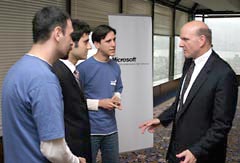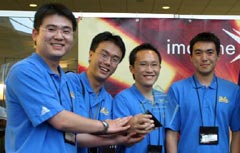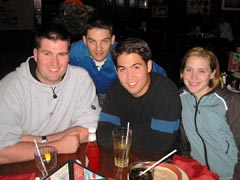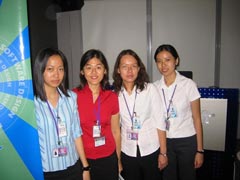REDMOND, Wash., June 23, 2004 — Some day, a blind person may better understand what’s around him or her, even in a city or neighborhood never before visited.

Imagine Cup 2004 Team Turkey meets Microsoft CEO Steve Ballmer. (L-R): Erkan Kurtulus, Mustafa Kasap (adviser), Soygur Kursun, Ballmer.

Team U.S.A. (L-R): Alex Chang, William So, Tree Li, Chris To.

Team Canada (L-R): Jason Kemp, Mike Flasko, Tyler Holmes, Elisa Johnson.

Team Malaysia (L-R): Su Ling Huan, Wai Keng Lee, See Mun Lee, E-San Ng.
Some day, a mobile phone or PDA may turn into a tip source for a hungry movie-goer seeking directions to the closest restaurant serving great Kung Pao chicken.
Some day, the manager of a tennis tournament might use wireless devices that automatically update all the participants about a schedule change.
Difficult to imagine? Not to participants in this year’s Imagine Cup ( www.imaginecup.com ), an annual, worldwide competition sponsored by Microsoft. This year, the contest expanded beyond software development to include short film, rendering (computer animation) and algorithms. The result: A diverse pool of entrants, geographically and by gender, as well as submissions that reflected the global interest of students to employ technology as a means of expression.
Through their work developing entries for the Imagine Cup, many students pushed themselves in ways they perhaps hadn’t thought possible, learning about new technology and how to apply academic training to solve real-world problems. “The contest drove us to unite and build toward our vision,” says Chris To, a member of the team that will represent the United States in the Imagine Cup finals in Brazil July 2-8. “The experience has been amazing.”
Finalists from 40 countries will be in Brazil, among them an all-woman team from Malaysia and teams from, Canada, China, France, India, Romania, Turkey and many other countries. Moreover, even though 2004 was only the second year for the Imagine Cup, it drew 10,000 competitors. They endured grueling regional and national reviews of their work, and a select few now meet in Brazil to present their work and hope to win first-place prizes of up to US$25,000.
The United States’ representatives in Brazil for the software-design invitational are from the University of California at Los Angeles. As with other contestants in this category, Chris To, William So, Tree Li and Alex Chang worked as a team to leverage mobile devices, the Internet and smart components in a way that could improve everyday life for its users.
The U.S. entry, which took first place in the national competition in May, is called Project PICKS. It’s a “digital concierge” that runs on mobile devices and is designed to help users answer everyday questions such as where to eat and where to find a particular shop. Using a Smartphone or a PDA, PICKS is aware of its location, and can take a particular question (“Where’s a good restaurant?”) and supply a list of possibilities in the neighborhood.
Project PICKS was built on the Microsoft .NET Compact Framework with the Microsoft Visual Studio .NET 2003 development system, and takes advantage of Web services as well as Microsoft MapPoint Location Services. Team UCLA has already received the U.S. National Champion title and its four members split a cash reward of US$8,000. Now they’re anxiously awaiting the trip to Brazil. “We are very nervous,” says To, “We have a U.S. title to defend [the 2003 Imagine Cup was won by Tu Nguyen of Nebraska] and all the ideas we’ve seen out there are really innovative.”
In Brazil, Project PICKS will face stiff competition from the likes of Quest, developed by Team Turkey – Erkan Kurtulus and Soygur Kursun. Quest combines wireless devices, GPS services and Microsoft MapPoint Location Services in a way that puts its user in immediate contact with useful services. Need a taxi? Quest can alert the nearest taxi stand and provide an exact location for pickup. Does a friend or spouse have a birthday? Quest can offer a reminder, then steer its user to the nearest floral shop. Stuck in traffic? Quest will offer a better route home.
Quest also could be a boon for blind or disabled people. Today’s GPS systems track a user’s location with such accuracy that even directions on a street (“Turn left in 10 meters”) can be sent to a Quest user.
Other Imagine Cup finalists include Team Canada, consisting of Elisa Johnson, Mike Flasko, Jason Kemp and Tyler Holmes, students at the University of Victoria in British Columbia. Its offering, inspired by Flasko’s involvement in tournament tennis, is called GameSetMatch. ?t’s aimed at solving the huge headache of organizing a sports tournament – registering entrants, scheduling games or matches, posting results. The Tournament Planner system walks the administrator through the process of creating, scheduling and hosting a tournament from start to finish. GameSetMatch also creates a Web site where participants can register for the tournament. If they wish, GameSetMatch also notifies participants of schedule changes or scores via e-mail, MSN, or MSN mobile.
Another is Team Malaysia — Su Ling Huan, See Mun Lee, E-San Ng, Wai Keng Lee. This team’s entry is I-Diners, a program designed to help both restaurant owners and potential customers. For owners, I-Diners keeps tabs on what customers are ordering, allowing a restaurant to adjust daily specials or prices based on what’s popular. For customers, I-Diners locates restaurants based on its users’ preferences, and can even dial a restaurant for a reservation.
In addition to teams competing in the software design category, the Imagine Cup finals will host entrants for three other competitions. They are:
-
The Rendering Invitational. In this category, student artists competed online to showcase their best computer-generated graphics using Microsoft Visual Studio .NET and the DirectX 9.0 API. Teams from Lithuania, Vietnam, Colombia, China and Belgium have advanced to the finals.
-
The Short Film Invitational. Another online category, the Short Film Invitational, focused on digital videos with the theme of the culture of innovation. Finalists are teams from Germany, the U.S., China, Romania and Canada.
-
The Algorithm Invitational. This individual competition called for entrants to display their grasp of fundamental mathematical and computer science concepts, in some cases by answering mind-bending technical questions online and on the fly. Finalists are Xiaomin Chen from Rutgers University (U.S.), Branimir Lambov from Aarhus University (Denmark), Vincent Lascaux from Ecole Centrale Paris (France), and Ying Wang and Li Weixing, both from Zhongshan University (China).
Winners in these three competitions will earn first-place prizes of $5,000 to $8,000.
For Imagine Cup entrants, the experience has been both challenging and exhilarating. Team Turkey, for instance, got so far advanced in its project that it ended up using a beta version of Microsoft software not yet available to the public. It also had to scrounge for a Pocket PC (a friend chipped in). And for all participants, there was the task of balancing work on the Imagine Cup with learning the new skills needed for the competition while also keeping up with schoolwork. “The process of learning new things is hard,” says Team Malaysia member Su Ling. “But each of us was assigned a different task, and we were able to learn new programming skills.” Adds Team Canada member Elisa Johnson: “Some of us learned .NET in order to participate in this competition; others have gained much knowledge as we found a way to make our idea a reality. We have all gained valuable experience that will help us in the pursuit of our careers.”
Microsoft officials who have worked with Imagine Cup teams say the breadth of innovation in this year’s Imagine Cup entrants bodes well for the future of technology. “We’ve really been amazed by the quality and diversity of the teams’ projects,” says Morris Sim, senior director of the Academic & Developer Community Group at Microsoft. “These students are the next-generation technology leaders and their creativity and innovation inspires us.”
Imagine Cup participants see technology as their path to a career and the future. For everyone else, it may mean a clear path out of traffic or to the nearest diner.
Secondary-Schoolers Show Talent in “Make a Difference” Scholarship Program
Technology has changed the world, but it’s individuals behind technology that are striving to make a difference, a notion Microsoft has encouraged this year with its “You Can Make a Difference” scholarship program. Aimed at secondary-school students, the program encourages tomorrow’s technology pioneers to develop creative ways to solve real societal problems – in this case, how they use technology to benefit a charitable organization. The program was sponsored by theSpoke.net, Microsoft’s digital lifestyle club for students around the world.
The result: 10 proposals from across North America benefiting a variety of organizations. Five male and five female students will receive a US$2,500 scholarship award, $1,500 to implement the proposed project, and a $1,000 technology grant to each of the selected students’ schools.
Winning entrants demonstrated creativity and technological savvy. “These students showed remarkable creativity in their project proposals, says Mario Jobbe, a technical product manager in the Academic & Developer Community Group at Microsoft, who helped administer the scholarship competition. “We are excited to watch the students make their project ideas a reality in the coming months.”
Inaugural winners include:
-
Cara Welch (Texas) plans to develop an online database and Web interface for a church to connect community service groups to those in need and those willing to give.
-
Justin Bevins (Virginia), proposes to create a database for an annual auction of a local chapter of the Cystic Fibrosis Foundation.
-
Khyati Patel (Texas) intends to build a software program to manage organization at a youth activity organization.
-
Lucy Lu (Ontario, Canada) will create a fundraising tracking system called “FundOrg” for an intergenerational charity to help organize and maintain donation records.
-
Anthony (Ontario, Canada) hopes to develop software to encode and encrypt patient medical history and images used at a local health organization.
-
Scott Hale (Wisconsin) proposes a project to benefit a local soccer club by developing a Web site and an application to manage referee schedules for home games.
-
Erica Dismang (Illinois) plans a project to teach students at a local school to be more effective with technology.
-
Tim Light (Virginia) intends to create “You Can Excel” to benefit at-risk students helped by a local family development center.
-
Jessica Fee and Kelsey Atkin (Alberta, Canada), plan to develop a healthy meal planner to benefit the Heart and Stroke Foundation of Canada.
-
Brian Kirchoff (New York) proposes a portal site to help students at his school communicate, express themselves and learn.




